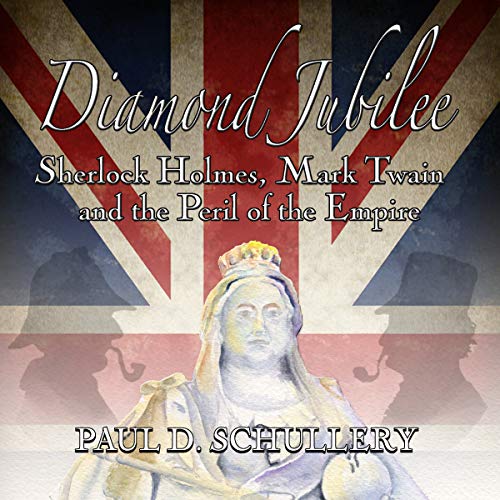
It’s June 1897, and the official celebration of Queen Victoria’s Diamond Jubilee—60 years on the throne—is approaching. Holmes and Watson receive an unexpected visit from Samuel Clemens (Mark Twain), wanting help with a very worrying puzzle. As Holmes and Watson try to solve the mystery of the wall-eyed man who seems to have followed Clemens from Johannesburg, South Africa to London, they also learn that there seems to be conspiracy centered on the Queen’s Jubilee, and that the two mysteries may be connected. It all builds to a frightening conclusion, with trusted allies possibly being untrustworthy or even enemies.
Diamond Jubilee: Sherlock Holmes, Mark Twain, and the Peril of the Empire, by Paul Schullery (author), Nick Crosby (narrator). MX Publishing, October 2018
Review By Lis Carey: Sherlock Holmes and Dr. Watson are at home at Baker Street, when they receive an unexpected visitor. It’s Samuel Clemens, a.k.a. Mark Twain, with a puzzle whose seriousness he is not quite certain of, but he fears the worst.
It’s June 1897, and Clemens is engaged in a world tour. It’s also the 60th anniversary of the reign of Queen Victoria, with the official celebration of her Diamond Jubilee coming up on June 22. A few weeks ago in Johannesburg, South Africa, Clemens had a disturbing yet seemingly minor experience.
He was giving one of his talks at a theater in Johannesburg. It was sold out, to the point that those with enough money to burn had seats on the stage not far from Clemens himself. He wasn’t happy about this, but he’s a professional, and concentrated on making his audience laugh. Mostly he succeeded–except for one of those men who’d paid for a seat on the stage, who never reacted at all. He was very distinctive, with a pronounced wall-eye, with that eye seeming larger than the other. His hair was also strangely spiky. Clemens worked hard to get a reaction, any reaction, and failed, but the rest of the audience was delighted, so he let it go. He didn’t see the man again.
At least, not until he arrived in London. Clemens settles his family in a quiet neighborhood, away from the literary high life, because he has both a book to finish, and their eldest daughter to mourn–Susy Clemens, who died in August 1896. As he is out visiting his English publisher, he sees, seemingly by pure chance, a man identical to the wall-eyed man in Johannesburg. The man is too quickly gone for Clemens to catch up to him or get any more information, but coincidence doesn’t seem a likely explanation. And due to other incidents, he thinks this may have to do not only with him, but with the Diamond Jubilee.
What follows is an alarming sequence of events, with the wall-eyed man entering and apparently searching both the Clemens residence and 221B Baker Street, and neatly evading successful tracking both times, Wiggins and the Irregulars finding confusing and disturbing information about him.
The police assign constables to guard the Clemens home after the wall-eyed man’s intrustion, and one of them is an atypically educated and cultured constable named Marston, who has an interesting family story, and is, like Watson, a veteraon of the Empire’s wars. He’s a good source of information, including leading them to a ratting club where the wall-eyed man often attends and becoms part of the entertainment.
Yet Holmes and one of the Clemens’s longtime household staff have real doubts about Marston’s intentions.
More evidence turns up, and Holmes and Watson go to visit Mycroft Holmes at his club–and get pulled into a very high-level meeting. The growing evidence that there’s a dangerous plot centered on the Diamond Jubilee is solidifying, and the government, from the Prime Minister on down, wants all hands on deck. Sherlock Holmes would have been sent for, if he and Watson hadn’t conveniently arrived under their own power.
There’s intrigue, a partially successful kidnapping, and the revelation of a more twisted plot than any had suspected. Both Watson’s medical skills and his military experience play an important role. The tension builds to a terrifying climax.
The story was good, and I liked the characters, including most of Doyle’s characters. I wasn’t thrilled with how Lestrade and Gregson were depicted, but the back of my mind is suggesting than Schullery got them more right than my memory. This was a really satisfying book, and the narrator did an excellent job.
I got this audiobook free as part of signing up for the publisher’s newsletter.
